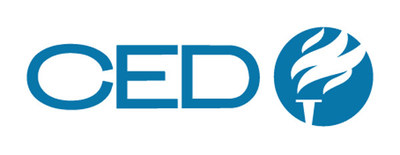|
CED Issues Plan to Ensure Reliable, High-Speed Internet Access for All Americans
WASHINGTON, March 2, 2021 /PRNewswire/ -- As America's business and public policy leaders work towards a post-pandemic economic recovery, they must address the affordability and access barriers to reliable, high-speed internet services that leave too many Americans and their families behind, says a new Solutions Brief report from the Committee for Economic Development of The Conference Board (CED). COVID-19 has driven even more of everyday commerce, work, health care, and education online, underscoring the critical role that internet access plays in American life and in the nation's ability to prosper and compete globally.
 As Broadband Access: Connecting America explains, adequate access to high-speed internet connectivity had become essential for families to pursue economic, educational, and quality of life improvements even before the pandemic. Past improvements in internet quality and access have greatly expanded economic opportunities for families while strengthening the pool of talented labor available to employers.
But as the report points out, more progress remains to be made. In fact, millions of Americans – some current estimates run to over 40 million – remain underserved when it comes to affordable access to high-speed internet, with the problem stretching across both urban and rural areas. While a greater share of rural households lack high-speed internet, roughly three times as many non-users reside in urban areas as rural ones.
"Information technology innovation and competition have been essential to delivering a higher quality of life and modern commerce," said Lori Esposito Murray, President of CED. "Policymakers must leverage the dynamism and innovation of the private market, increase competition, and invest wisely in order to close the enduring gaps to access and reliability."
The new CED report offers six specific policy proposals that policymakers and business leaders should implement. Recommendations include:
- Improve market competition for high-speed internet provision. Robust competition is the surest way to both cost savings and innovation, but the high ixed costs and sole ownership of costly-to-duplicate network infrastructure often increases high-speed market concentration in many areas. Policymakers must take steps to reduce burdens and expand eligibility for potential participants and providers that could help expand broadband access. Efforts to increase competition should also include preempting laws in the 20+ states that ban or restrict municipalities from offering high-speed internet services.
- Update the Federal Communications Commission's definition for high-speed internet service to a more ambitious and forward-looking standard, reflecting the needs of households engaging in remote work, training, and education opportunities. The FCC's current standard of 25Mbps download and 3 Mbps upload, unchanged since 2015, should be modernized to upload and download speeds of at least 100 Mbps ("100/100"). An improved standard will better reflect the state of US connectivity and avoid directing federal investment to networks that are either substandard or will soon be outdated.
- Leverage public assets to advance private market provision. In many areas, publicly-subsidized or publicly-owned high-speed internet connections have reached schools and other "anchor institutions" but access or provider competition is limited in the surrounding communities. Private providers should be permitted to expand networks from those existing community nodes, provided it will not degrade services at those institutions. In addition, high-speed internet providers should be allowed to coordinate their network expansions or upgrades with new and ongoing publicly-funded infrastructure projects, allowing them to take advantage of planned construction to advance connectivity. Finally, policymakers should evaluate including empty conduits or funding open-access networks which could ease subsequent expansion of private high-speed internet service.
- Improve affordability by reforming existing federal support programs. The FCC's Lifeline program is ill-suited to modern needs. Lifeline, which was originally created with telephone service in mind, typically provides less than $10 per month to high-need households, suffers from low participation, and typically subsidizes internet access indirectly. Lifeline service eligibility should be expanded to fixed internet providers, increasing competition and quality. And with high-speed internet access so central to job-searching, lawmakers should also expand eligibility for support to some recently unemployed workers on a time-limited basis.
- Federally fund a one-time investment to build out upgradable high-speed internet networks to jump-start coverage for areas currently without broadband access.
- Bolster internet market transparency for policymakers and consumers alike. Congress should fund up-to-date detailed Census Bureau surveys of individuals and businesses on why they use the internet, which devices they use, and what their options and costs are for service. In addition, the FCC should more aggressively promote its "Broadband Facts" consumer label standard to help customers demand better service and spur competition among providers on clearer grounds.
"Widespread, high-speed internet adoption feeds the economic competitiveness and strength of the whole nation", added Lori Esposito Murray. "Studies have shown that wider access to broadband is associated with faster growth both nationally and regionally. Importantly, that also means that if the US fails to stay competitive in terms of broadband access, it runs the risk of becoming less attractive for international investment."
The new report – the latest in a series of Solutions Briefs – can be accessed here.
About CED
The Committee for Economic Development of The Conference Board (CED) is the nonprofit, nonpartisan, business-led public policy center that delivers well-researched analysis and reasoned solutions in the nation's interest. CED Trustees are chief executive officers and key executives of leading US companies who bring their unique experience to address today's pressing policy issues. Collectively they represent 30+ industries, over a trillion dollars in revenue, and over 4 million employees. www.ced.org
About The Conference Board
The Conference Board is the member-driven think tank that delivers trusted insights for what's ahead. Founded in 1916, we are a non-partisan, not-for-profit entity holding 501 (c) (3) tax-exempt status in the United States. www.conference-board.org
 View original content:http://www.prnewswire.com/news-releases/ced-issues-plan-to-ensure-reliable-high-speed-internet-access-for-all-americans-301238632.html View original content:http://www.prnewswire.com/news-releases/ced-issues-plan-to-ensure-reliable-high-speed-internet-access-for-all-americans-301238632.html
SOURCE Committee for Economic Development of The Conference Board (CED)

[ Back To TMCnet.com's Homepage ]
|


